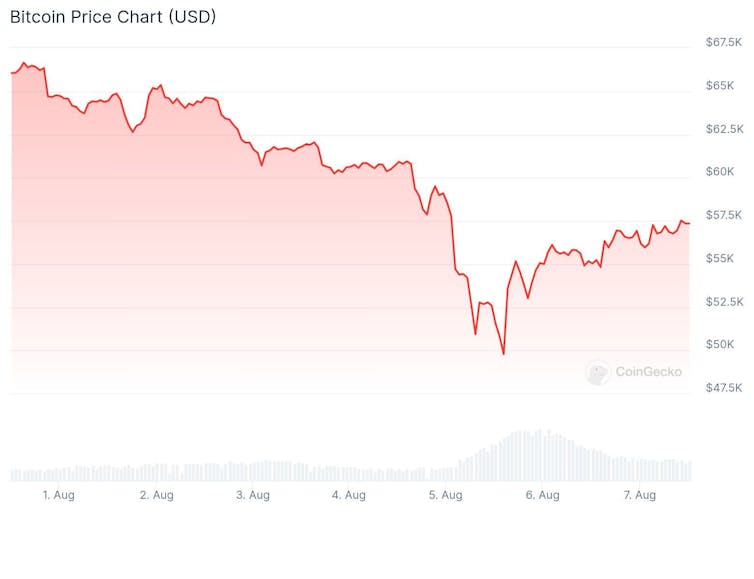why it rattled the crypto market
- Written by Larisa Yarovaya, Director of the Centre for Digital Finance, Associate Professor in Finance, University of Southampton

Japan’s stock market plunged 12% on Monday[1], August 5 – its worst day in 37 years. The severity of the fall triggered losses[2] in stock markets around the world. In the US, for example, the Nasdaq index dropped more than 6%, while the S&P 500 dipped by 4.25%.
Markets have since rebounded[3] slightly. The Nasdaq climbed 1.5% on Tuesday, while Japan’s Nikkei 225 closed 10.2% higher than at the start of the day. But there may still be bumpy weeks ahead[4].
A key reason for these bearish markets is fear of a slowdown[5] in the US economy. US job market data published on August 2 reported the highest unemployment rate[6] since October 2021 alongside weaker than expected job growth. This has caused pessimism to spread among investors about an impending recession in the world’s biggest economy.
The chairman of the US Federal Reserve, Jerome Powell, has suggested[7] that an interest rate cut can be expected in September. Lower interest rates typically mean cheaper borrowing and should boost economic growth.
However, July’s cooling of the US job market has led to speculation that the Fed has waited too long[8] to act. The central banks of other developed economies, such as the Bank of England and the European Central Bank, have already cut interest rates[9].
Shares of tech companies, both in the US and elsewhere, were also down[10]. And cryptocurrency markets went into decline as well. The price of crypto market leader, Bitcoin, dipped below US$50,000[11] (£39,000) after trading close to a record US$70,000 just one week ago.
Other crypto tokens, such as Solana and Dogecoin, also experienced a drop of up to 30%[12] in price over the same period.
Read more: Make Bitcoin great again – what Donald Trump's backing of crypto could mean for the industry[13]
This cryptocurrency sell-off has been largely attributed to the same fears of a US recession that caused the stock market to briefly crash. However, from a financial perspective, this contagion effect is particularly interesting.
Cryptocurrency was designed to be independent from any centralised authority. It was intended to offer an alternative form of money and an investment asset immune to the flaws of the traditional financial system.
This was true to some extent before 2017, during the early days of crypto adoption. According to research[16] published in 2018, cryptocurrency markets were relatively isolated and “decoupled” from traditional markets.
However, cryptocurrencies have over time become more integrated into the financial system and are no longer immune to volatility spillovers from non-crypto markets.
Separate research[17] has analysed Bitcoin’s response to US interest rate announcements and found that the intensity of the response to monetary policy news depends on the type of digital asset.
Cryptocurrencies that are closely related to “currency” in their function, such as Bitcoin, should respond strongly to the Fed’s announcements. These cryptocurrencies are used heavily for financial transactions and, therefore, are likely to be sensitive to changes in consumer demand and the overall economic environment. Both of these factors are influenced by monetary policy.
On the other hand, so-called crypto protocols like Ethereum primarily serve as platforms upon which a variety of crypto products can be built, such as non-fungible tokens (NFTs). In theory, a protocol’s price should have a slower and less severe response to monetary policy announcements compared to “pure” cryptocurrencies.
However, crypto assets across all categories have experienced a unified downfall over the past week. The price of Ethereum[18], for example, fell to its lowest point of 2024 on August 5, showing that financial panic can transmit quickly and efficiently across all markets. Crypto’s popular appeal of decentralisation and independence from traditional finance simply does not hold.
The value of a cryptocurrency is also largely driven by investor sentiment, with news and social media announcements playing a crucial role in shaping this. So, it’s possible that cryptocurrencies respond even more severely to such shocks than stock markets themselves.
Crypto assets are volatile, which makes them appealing to some investors who embrace risk. Current prices may be low, but crypto investors are accustomed to volatility and, as with every dip, are evaluating whether now is a good time to buy.
The problem is that technical analysis — interpreting up and down price trends — is often highly inaccurate in any market. And prices may still have room to fall further given that cryptocurrencies have only dipped below their all-time highs.
Early academic research[21] on cryptocurrency bubbles concluded that, as crypto has no fundamental value, Bitcoin’s true price is zero. This idea may seem far-fetched today. But a complete collapse in value remains a plausible scenario in the future for many crypto tokens.
Any new information, such as interest rate announcements, political events like the US election[22], or the further adoption of crypto assets by institutional investors, can rapidly alter the direction of crypto prices.
References
- ^ plunged 12% on Monday (www.independent.co.uk)
- ^ triggered losses (edition.cnn.com)
- ^ rebounded (www.theguardian.com)
- ^ bumpy weeks ahead (www.wsj.com)
- ^ fear of a slowdown (www.bbc.co.uk)
- ^ highest unemployment rate (www.bbc.co.uk)
- ^ suggested (www.thisismoney.co.uk)
- ^ waited too long (www.bbc.co.uk)
- ^ already cut interest rates (www.ft.com)
- ^ were also down (www.forbes.com)
- ^ below US$50,000 (www.cnbc.com)
- ^ up to 30% (fortune.com)
- ^ Make Bitcoin great again – what Donald Trump's backing of crypto could mean for the industry (theconversation.com)
- ^ Coingecko (www.coingecko.com)
- ^ CC BY-NC-ND (creativecommons.org)
- ^ research (doi.org)
- ^ research (doi.org)
- ^ Ethereum (www.forbes.com)
- ^ Coingecko (www.coingecko.com)
- ^ CC BY-NC-ND (creativecommons.org)
- ^ research (doi.org)
- ^ like the US election (theconversation.com)
Read more https://theconversation.com/japan-stock-meltdown-why-it-rattled-the-crypto-market-236266







